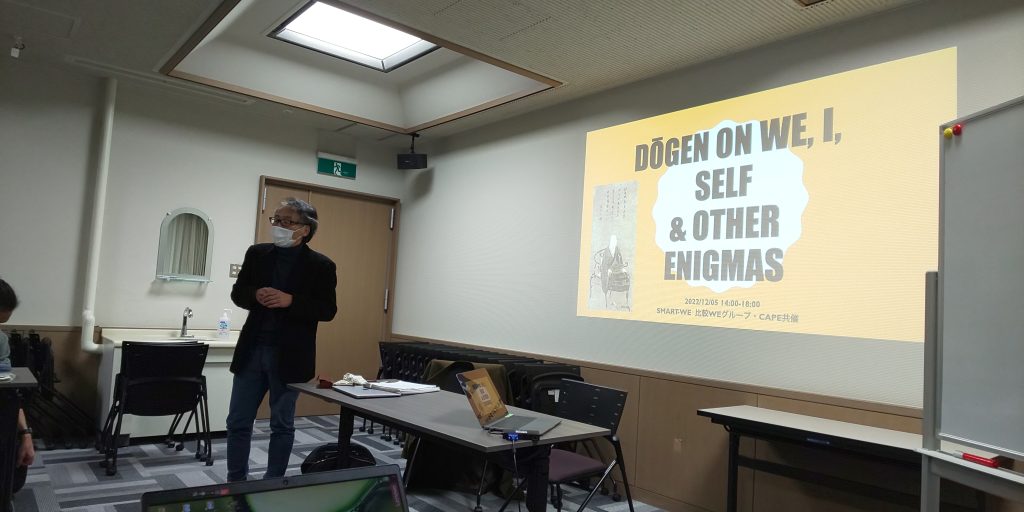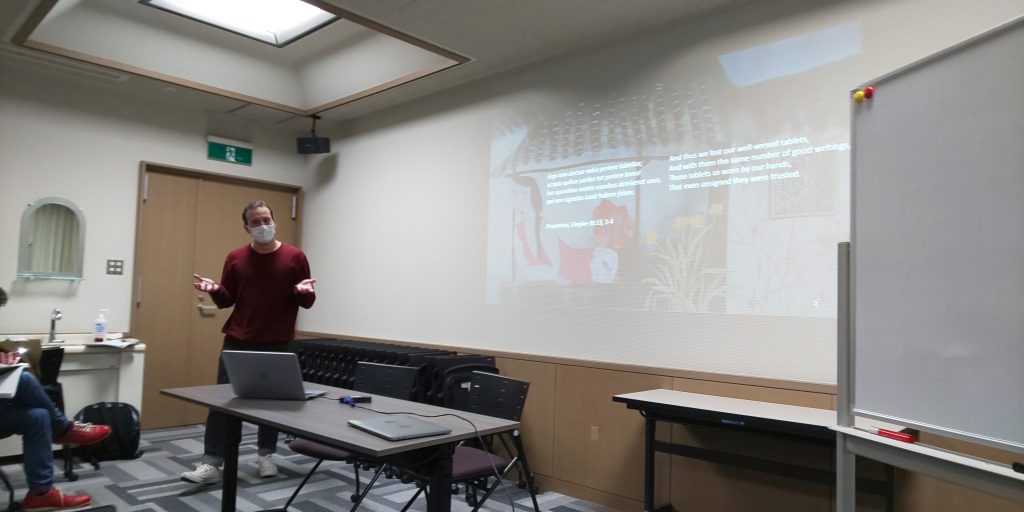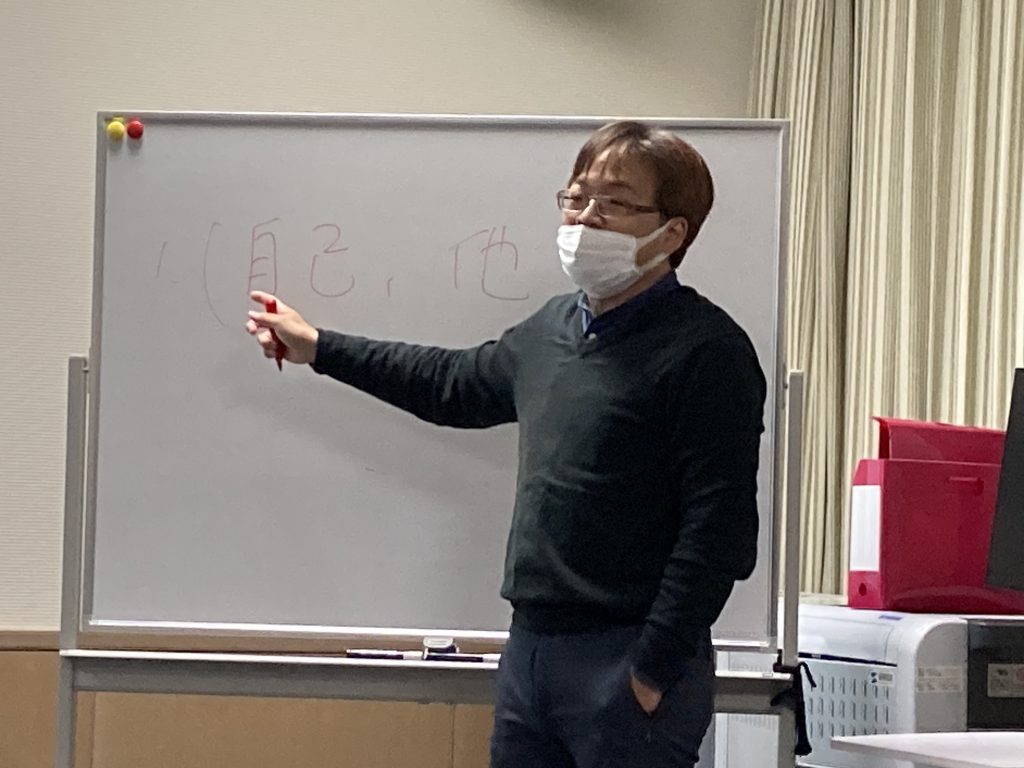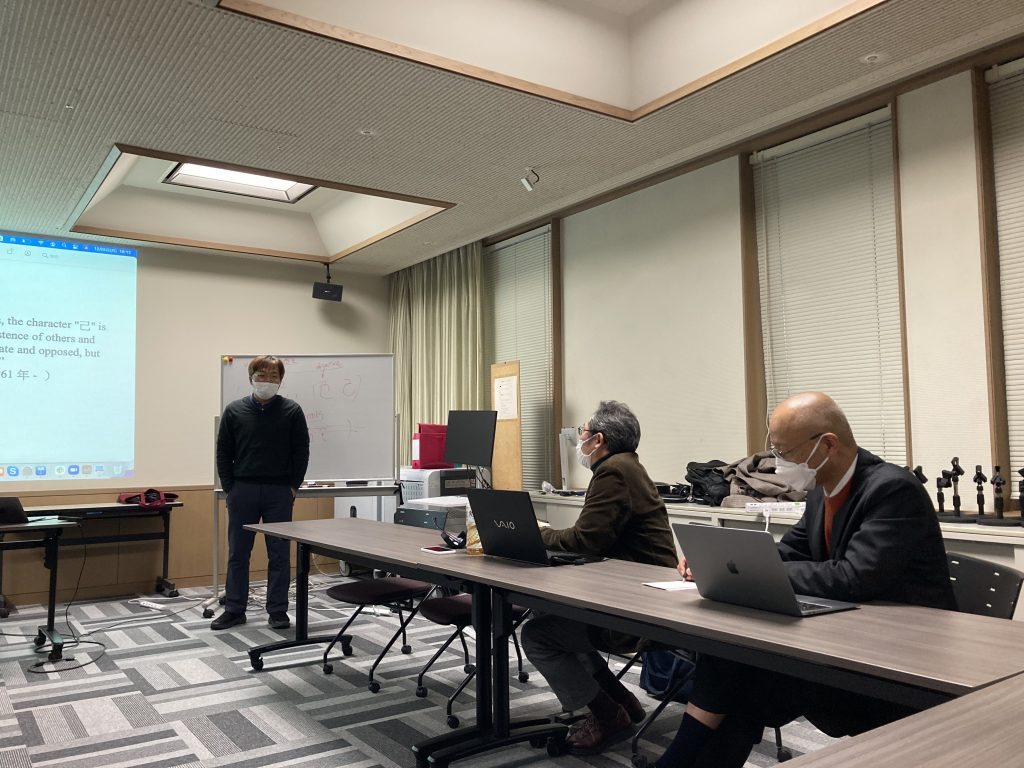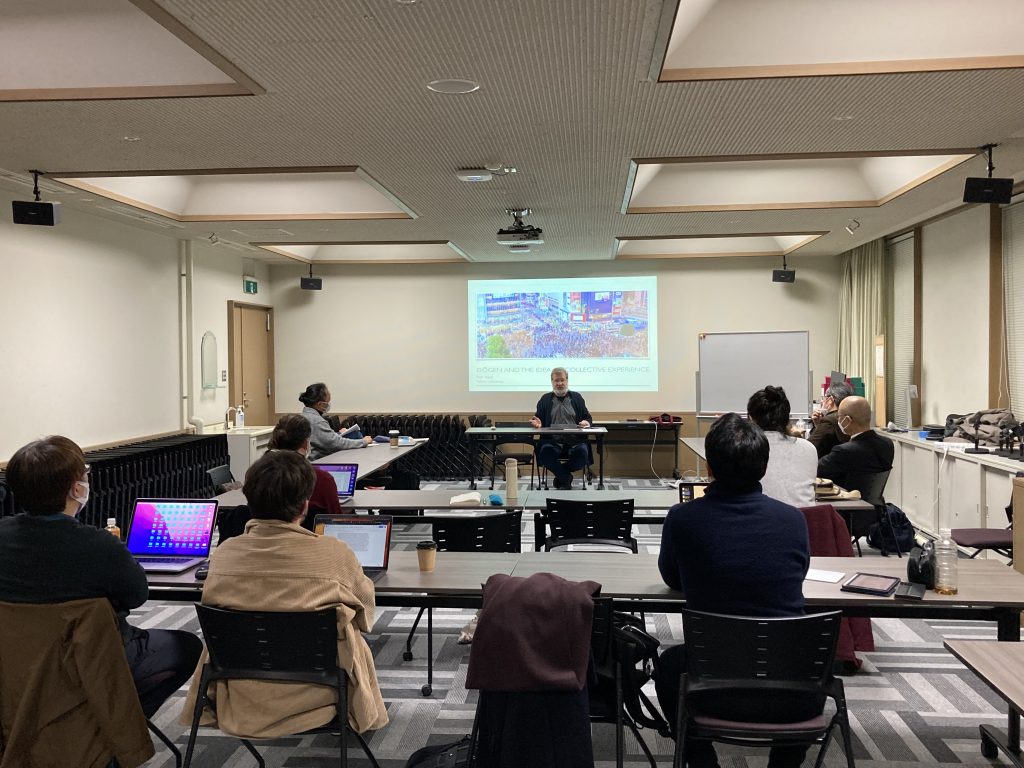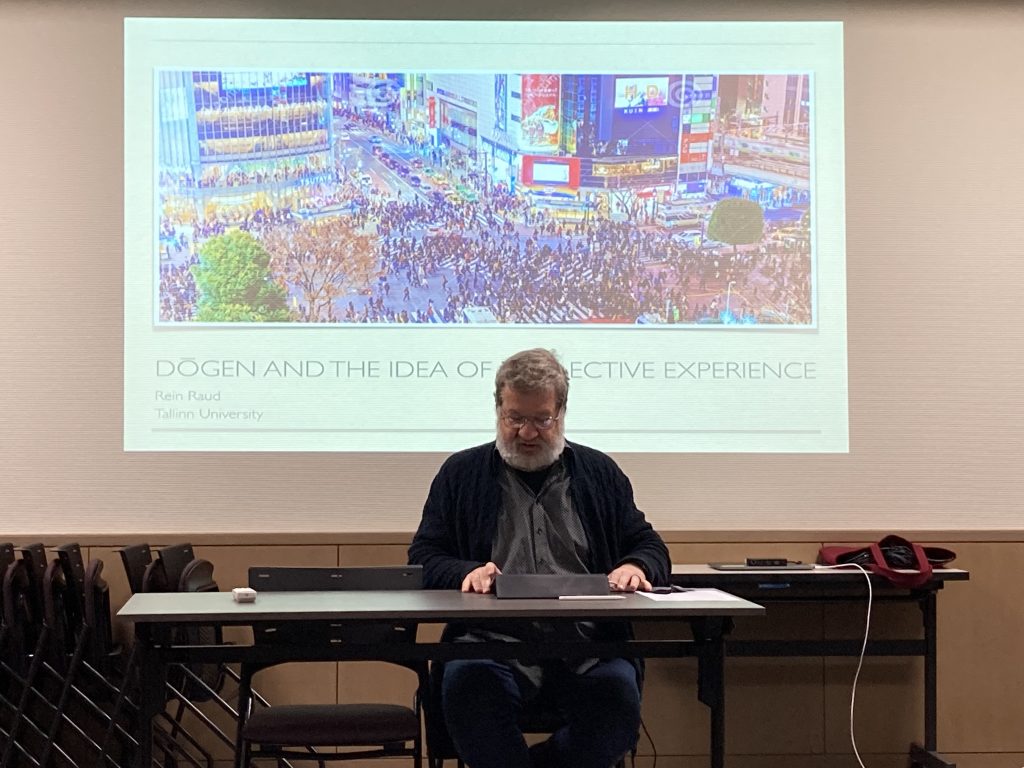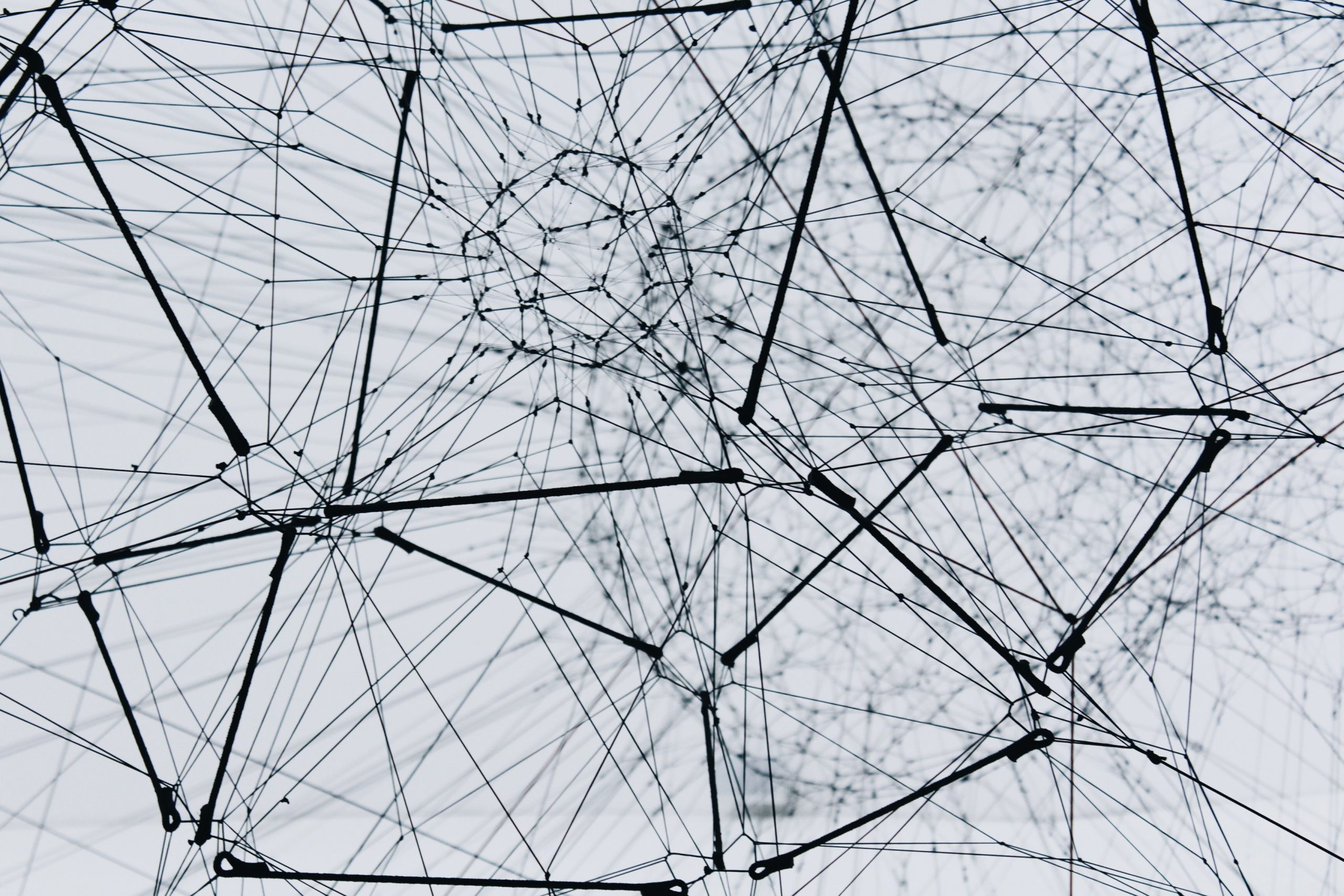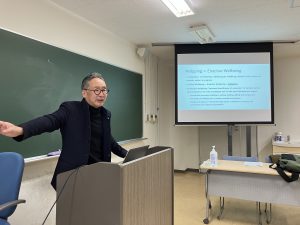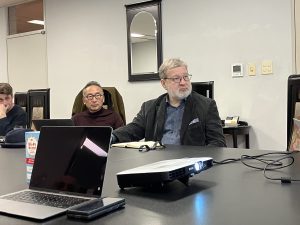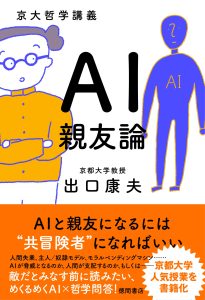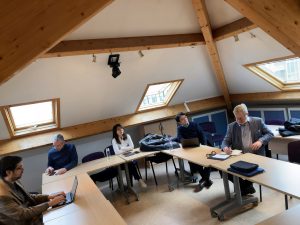“Dōgen on WE, I, Self & Other Enigmas” workshop will be co-hosted by the Comparative WE Studies Group of this project and CAPE (Center for Applied Philosophy and Ethics, Graduate School of Letters, Kyoto University).
“Dōgen on WE, I, Self & Other Enigmas” workshop
Date:5th Dec., 2022.(14:00-18:00)
Venue:Large Conference Room in the Main Building of Faculty of Letters, Kyoto Univ.
Speaker:Yasuo Deguchi, Rein Raud, Felipe Cuervo, Hsun-mei Chen
About the workshop: While being co-hosted by CAPE (Center for applied philosophy and ethics, Graduate School of Letters, Kyoto University), this workshop is organized for the Comparative WE group of the JSPS project, but open to all members and even non-members of the JSPS/JST projects.
The main questions to be discussed include how to explore Dōgen’s ideas of WE, I, self and other important philosophical themes such as the world, body, vulnerability and how to reactive them for the contemporary intellectual milieu and social issues such as smartization of our community.
Program
14:00-14:40 Yasuo Deguchi Self-as-Anything: Dōgen on Self, the world and others
14:40-15:20 Felipe Cuervo The Unremarkable Transcendence of Everyday Life: Dōgen and Isasi-Díaz on Day-to-Day Liberation
15:20-15:35 break
15:35-16:15 Hsun-mei Chen A We-turn on Dōgen’s Philosophy
16:15-16:55 Rein Raud Dōgen’s views on Buddha-nature and the collective experience
16:55-17:00 break
17:00-17:50 Discussion
Abstracts of each presentation are as follows:
Yasuo Deguchi: Self-as-Anything: Dōgen on Self, the world and others
This presentation aims to clarify Dōgen’s ideas on “self” and the relations between “self” and “world” and between “self” and “others” and to interpret them as a philosophical refinement of the concept of “true self” in Tathāgata-garbha thought, specifically, Awakening of Faith in the Mahāyāna. For this purpose, this presentation will use “trope,” or “particularized or instantiated abstraction,” a conceptual device of contemporary analytic metaphysics, to interpret Dōgen’s concept of “Buddhahood” as a “Buddhahood trope” in order to understand Dōgen’s “true self” as “self-as-event”, “self-as-action”, “self-as-trope”, “self-as-anyone”, and “self-as-anything”.
Rein Raud: Dōgen’s views on Buddha-nature and the collective experience
In the Bendōwa, Dōgen famously speaks about how the mind of a practitioner — “just one person engaged in zazen at one moment” — is united through this experience with everything and everyone, and in the Genjōkōan, he calls this experience “dropping off the bodymind” (shinjin datsuraku) of oneself as well as all others. Throughout the “Core Transmission”, this same experience has been described as what “the Buddhas and ancestors” have all been teaching, and the Busshō fascicle presents in more detail Dōgen’s views on the relations between the particularity of the individual human being and the universal Buddha-nature that characterizes all existence. When put together, these ideas point to the notion of collective experience at the heart of Dōgen’s thought. My talk will elaborate on this notion and also argue that such experience should not be understood as a mystical communion with higher spheres, but as a wholly rational mode of adjusting one’s way of being in the world as well as one’s attitude toward one’s surroundings.
Felipe Cuervo: The Unremarkable Transcendence of Everyday Life: Dōgen and Isasi-Díaz on Day-to-Day Liberation
At first glance, it seems strange that philosophers as worried about enlightenment, liberation from pain, breaking away from the world of attachment/oppression, etc., as Dōgen and Ada María Isasi-Díaz dedicate so much of their time and effort to discussions of the most ordinary of our everyday activities. And yet both philosophers argue that it is precisely in such details that enlightenement and/or liberation is to be found. I intend this presentation to be mainly a work in comparative philosophy, trying to make sense of both Dōgen and Isasi-Díaz by contrasting their arguments and perspectives on the metaphysics of everyday life and its ethical (perhaps soteriological) components, though I will also argue for the general validity of some of their views, and sketch a contemporary metaphysics of daily life that accounts for their insights.
Hsun-mei Chen: A We-turn on Dōgen’s Philosophy
One common theme in contemporary Dōgen studies is to reveal how Dōgen understood the true self, and usually, the discussion on the true self also pertains to how Dōgen understood Buddha nature (佛性). Moreover, the Japanese Zen school founded by Dōgen, Sōto, has been categorized as a school advocating the idea of self-power (自力). Therefore, it seems the self plays a crucial and fundamental role in Dōgen’s philosophical enterprise. Nevertheless, the number of appearances of Ware (ワレ) and Zigo (自己) in Dōgen’s Shōbōgenzō (正法眼藏), Pure Rules of Eihei (永平清規), and Advice to Students of the Way (學道用心集) are 496 times, which is much lesser than the total numbers of syū (眾, 1155 times) and gun (群, 52 times) in those texts. Of course, the numbers do not necessarily imply the importance, but those usages of syū and gun indicate that at least the group or we are not just peripheral concepts in Dōgen’s system. To argue for the importance of the concept of we in Dōgen’s philosophy, I would first present how Dōgen uncommonly provided four terms: ujou (有情),syujou (眾生), gunjou (群生), gunrui (群類), gunu (群有) to explain Buddha nature at the beginning of Busshō chapter and how he associates Buddha-nature with his unique definition of we. Then I will show how Dōgen establishes the monastic rules and even Zazen practice based on Buddha nature and the concept of we.
If you wish to participate, please contact the Office of Smart WE Project (smart-we.office[at]bun.kyoto-u.ac.jp).
